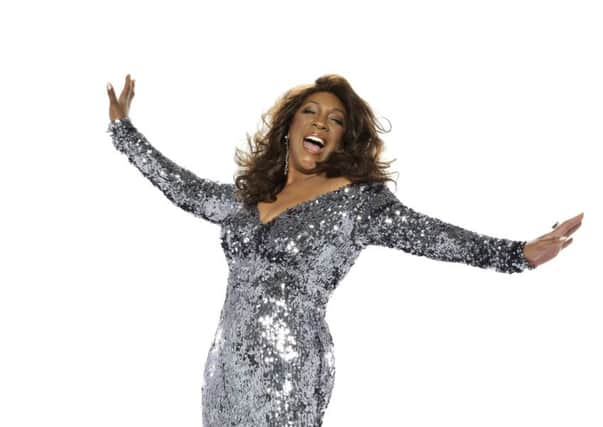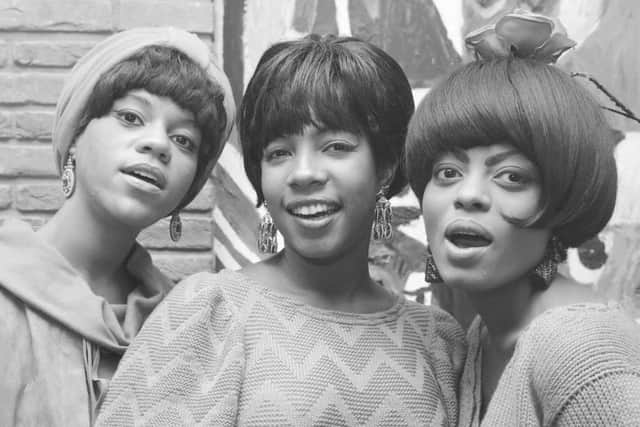BIG INTERVIEW: Mary Wilson looks back on how The Supremes and Motown made history as she prepares to play Portsmouth Guildhall
This article contains affiliate links. We may earn a small commission on items purchased through this article, but that does not affect our editorial judgement.


But more than 50 years since they began, Mary Wilson is still going strong. And tonight, she appears with her former Motown labelmates, Martha Reeves and The Vandellas in a special double-header at Portsmouth Guildhall as part of this year’s Portsmouth Festivities.
She’s over in the UK for a short string of dates, including the Royal Variety Show at The Palladium in London on Sunday.
Advertisement
Hide AdAdvertisement
Hide AdBut tonight is the only date with Martha. The Guide asks Miss Wilson how often they get the chance to work together.


‘It’s not often, but we do them occasionally, and I work not only with Martha, but also with the Four Tops and The Temptations too, and it’s always fun too. For us, the Motown artists, it’s really more of a family thing, it’s almost like a family reunion, we were very young then and we share all of that history.’
The Motown label was first to pursue the crossover market for both blacks and whites, and had a roster featuring Smokey Robinson, Stevie Wonder and Marvin Gaye among many more. But The Supremes, Florence Ballard, Mary and Diana Ross, pictured below in 1965, were arguably the label’s biggest stars – after a slow start, they notched up 12 number ones including Baby Love, Stop! In The Name of Love and You Keep Me Hangin’ On.
‘We were a group. We were a whole, total package. I really miss being part of a group, but I found out that after the original Supremes, after we made all of the history, it was just never the same as the original trio.
Advertisement
Hide AdAdvertisement
Hide Ad‘Even though we had some great singers, I had in with me Jean Terrell, who did all of the ’70s hits, and Cindy Birdsong, they were great singers, but the original three, we were The Group,’ you can hear the capitals, ‘like The Beatles, you know? Anyone who comes in later, it’s wonderful, but it’s just not the same feeling we had as those young girls when we were starting out.’


Her family moved to Detroit from Mississippi when she was young, as part of the migration of blacks to the north in search of jobs, ‘and a better life.’ The housing project she and the other Supremes lived in growing up was recently demolished. (Mary was given a brick from it.) And Detroit has become something of a symbol of urban decay as the domestic motor industry collapsed, while many who could leave, did.
But Mary returns there regularly, and is upbeat about its future.
‘It’s a different city now, it’s bustling, lots going on there.
Advertisement
Hide AdAdvertisement
Hide Ad‘I was just there for the Rhythm and Blues Hall of Fame, I was hostess, we inducted lots of R’n’B artists and because it was in Detroit, it was really cool. Detroit is making a Come. Back.’
Mary is justifiably proud of the role The Supremes and the Motown acts had in effecting social change. When they began America was still a legally segregated nation.
‘In those days, being an Afro-American you had to be aware of it – there were some things by law you could not do. You couldn’t go to certain places, you couldn’t live in certain areas, you had to drink out of public water fountains that said: “Colored only”. People were oppressed back then. We were from a time when our parents, their parents had been slaves.
‘It was not an easy time to grow up, but we did grow up and make changes, and through singing we helped to make those changes by daring to dream. Motown was one of those places that came up with this new idea – it not only opened up America, it opened up the world. Motown came over to England and The Beatles came to America, so borders were opening up.
Advertisement
Hide AdAdvertisement
Hide Ad‘We were a part of it and we managed to do it through music. Martin Luther King rallied and got the people together – there were many different ways of making that change.’
Mary though, doesn’t live in the past, she’s got a packed schedule now.
‘It’s busier than ever and I’m thankful for that. It’s amazing – who knew that 50 years on we would still be doing this? So it’s kind of surprising but it’s also a wonderful feeling to still have that longevity of a career – that’s something that a lot of people don’t experience.’
She’s also a regular on stage, she recently finished a run in Menopause: The Musical and has appeared in The Vagina Monologues among others. And at 73 she’s started doing more film work.
Advertisement
Hide AdAdvertisement
Hide Ad‘I’m doing lots of things, still touring around the world and having a ball, and still recording music.’
She has a completed album in the can that Mary hopes will eventually see a release.
But will there ever be any kind of Supremes reunion?
‘First of all, Florence Ballard is no longer alive, but I also believe that Diana Ross doesn’t want to do The Supremes, she’s Diana Ross, and so for her, I don’t think it’s something she wants to go back to. But you never know how the cards are going to play out. We’ll just have to wait and see – I have no clue, I’d be very happy if it were to happen, but sometimes things don’t go the way you want to.
‘I know fans would love to see that, but sometimes you can’t go back.’
* Mary Wilson and Martha Reeves are at Portsmouth Guildhall tonight, doors 7pm. Tickets £30.45 to £32.65. Go to portsmouthguildhall.org.uk.